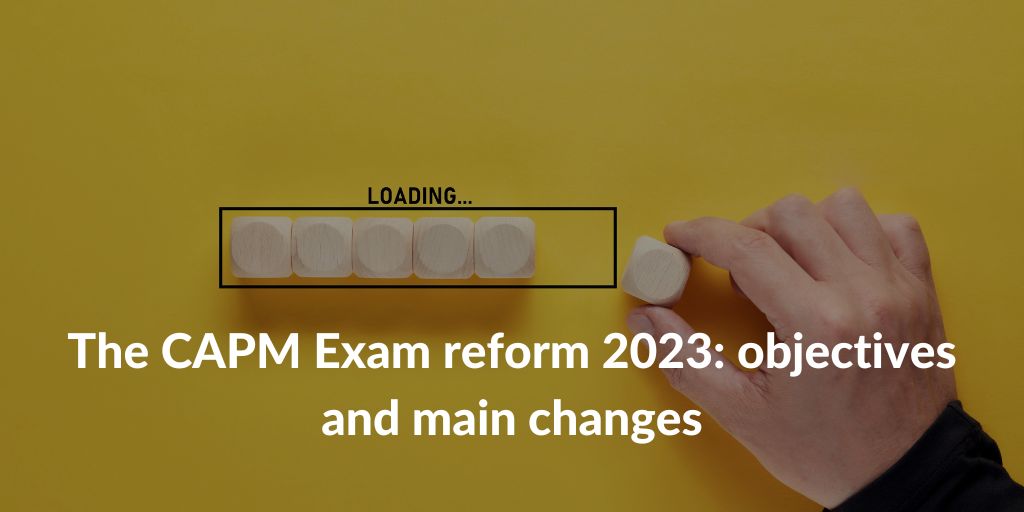The Project Management Institute’s CAPM (Certified Associate In Project Management) certification is designed for junior project managers who want to take on more responsibility and add key project management skills to their profile.
CAPM certification has always been seen as a good entry point and preparation stage for the Project Management Professional (PMP) exam. The PMP exam has undergone major changes as of January 2021, with the introduction of agility in the Exam Content Outline and a review of the areas covered. However, CAPM certification has not followed this development and remains based on the processes and knowledge domains of version 6 of the PMBOK (Project Management Body of Knowledge).
The aim of this article is to present the forthcoming reform and the new broad outlines of this certification, which will come into force in July 2023.
Objectives of the reform
As with the new guidelines for PMP certification, even novice project managers must have basic knowledge and skills in the different approaches to project management (predictive, adaptive or hybrid) and must be able to adapt to these contexts.
The recent reform of the PMP certification has created a considerable GAP in relation to the current version of the CAPM exam, which remained aloof from modern project management approaches, particularly agility. As a result, CAPM has ceased to be seen as a good entry point and source of facilitation for PMP certification preparation.
The PMI recently announced a new reform of the CAPM exam by updating the examination outline (ECO) and associated tasks. A global analysis of practices was carried out through in-depth market studies and an analysis of professional tasks to identify trends not covered by the CAPM certification as it currently stands. The examination questions were reviewed by experts on the basis of the new ECO.
It should be noted that this new reform contains elements in common with the new version 7 of the PMBOK. However, the PMI points out that the latter version is not the only source of development and that the ECO-CAPM is also derived from the review of professional practices and other resources.
This reform will come into force from July 25th 2023.
Outline of the new CAPM exam
The new exam will no longer be based on the PMBOK version 6 domains, but rather on the following domains:
- Project Management Fundamentals and Core Concepts: 36% of questions
- Predictive, Plan-Based Methodologies: 17% of questions
- Agile Frameworks and Methodologies: 20% of questions
- Business Analysis Frameworks: 27% of questions
These domains are defined as high level knowledge areas that are essential to the practice of project management. Each domain is subdivided into different ‘tasks’. These tasks define the underlying responsibilities of the project team member within each domain area.
Project Management Fundamentals and Core Concepts:
- Demonstrate an understanding of the various project life cycles and processes
- Demonstrate an understanding of project management planning
- Demonstrate an understanding of project roles and responsibilities
- Determine how to follow and execute planned strategies or frameworks
- Demonstrate an understanding of common problem-solving tools and techniques
Predictive, Plan-Based Methodologies:
- Explain when it is appropriate to use a predictive, plan-based approach
- Demonstrate an understanding of a project management plan schedule
- Determine how to document project controls of predictive, plan-based projects
Agile Frameworks and Methodologies:
- Explain when it is appropriate to use an adaptive approach
- Determine how to plan project iterations
- Determine how to document project controls for an adaptive project
- Explain the components of an adaptive plan
- Determine how to prepare an execute task management steps
Business Analysis Frameworks:
- Demonstrate an understanding of business analyses (BA) roles and responsibilities
- Determine how to conduct stakeholder communication
- Determine how to gather requirements
- Demonstrate an understanding of product roadmaps
- Determine how project methodologies influence business analysis processes
- Validate requirements through product delivery
With this new orientation, the CAPM certification aims to provide novice project managers with a good base of knowledge that is both versatile and balanced between the predictive, hybrid and agile approaches. The exam does not focus exclusively on the waterfall approach, which makes it easier to adapt to the realities of organisations and the way they manage their projects.
In my opinion, the new breakdown of the CAPM certification ECO shows the importance given by the PMI to the “Business Analysis” domain. The junior project manager is required to understand good practice in the elicitation of stakeholder requirements and often takes on the role of a business analyst in parallel with other project activities.
CAPM Exam resources
The CAPM 2023 exam will draw upon a pool of 7 resources to help inform questions including:
- PMBOK® 7th edition
- Process Groups: A Practice Guide
- Agile Practice Guide
- Business Analysis for Practitioners: A Practice Guide
- The PMI Guide to Business Analysis
- Effective Project Management: Traditional, Agile, Extreme, Hybrid
- Project Management Answer Book, 2nd Edition
These resources reflect the goal to include agile and hybrid approaches, business analysis principles and requirements management content. It also makes it more difficult to study on your own using so many different books to prepare for the CAPM and PMI highly advises to follow a CAPM Exam Preparation training.
The CAPM examination process
The conditions for taking the exam have not really changed. What is new is that you can now take a 10-minute break after completing a block of 75 questions.
It should be remembered that the exam still consists of 150 questions (with 5 unmarked questions) and lasts 3 hours.
The conditions of eligibility remain the same: you must hold a diploma equivalent to the BAC or higher and have completed 23 hours of training.
Source: PMI









